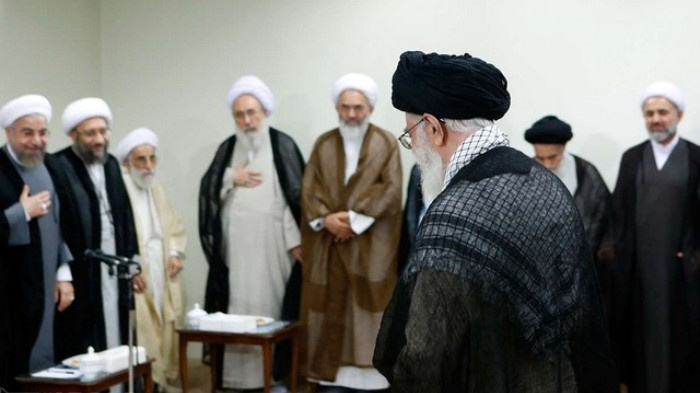No Council for Reformist Men

(Members of the Council of Experts meet Supreme Leader Ayatollah Khamenei in September 2014. Photo: khamenei.ir)
The Guardian Council announced the list of eligible candidates for the upcoming Council of Experts' elections today. The announcement was made following weeks of speculations about the fate of a number of well-known nominees, among them Seyyed Hassan Khomeini. Following years of low-key presence in politics, grandson of the revolution leader Ayatollah Khomeini ultimately decided to expose himself to popular vote and run for the Council of Experts, the body responsible for supervision of the Supreme Leader’s conduct and appointment of the next leader of the Islamic Republic.
Compared to the presidential and parliamentary elections, the Experts' Council poll was less politically-laden up until the recent years. The official discourse aims to differentiate between elections in the Islamic Republic and the West: this is not a rivalry between power-thirsty politicians, but a friendly competition of devoted men to better serve the Islamic community. This narrative becomes more exaggerated when it comes to the Council of Experts, where the members should enjoy a high level of knowledge in fiqh, Islamic theology, which should naturally result in piety.
Despite the critical responsibility assigned to the council, its conduct so far has never gone beyond annual meetings and release of statements endorsing the Supreme Leader. Nor have its debates and discussions attracted that much of public attention. The 2006 elections for the fourth council in Tehran provoked short-lived interest since they were viewed as a reexamination of Hashemi Rafsanjani’s popularity one year after he had surprisingly lost the presidential election to his unknown rival Mahmoud Ahmadinejad. Hashemi emerged victoriously as the leading candidate with a margin of more than 500 thousand votes. The same council assumed a more vocal role for itself following the 2009 presidential elections and protests that targeted the highest levels of the establishment. Halfway through its term, the fourth council witnessed struggles over the position of speakership. Akbar Hashemi Rafsanjani who had chaired the council from 2009 to 2011 stepped aside in favor of Ayatollah Mahdavi Kani. At the time, Hashemi was under extreme pressure from Principlists and conservatives both inside and outside the council for his thinly veiled support of the Green Movement. Hashemi however ran for the next poll held in early 2015 after Mahdavi Kani’s death. This time he ran against Mohammad Yazdi, his long-time critic, and to surprise of many political observers faced a bitter defeat, collecting 24 votes against 47 votes of Yazdi.
With the first generation of the revolutionaries, including Ayatollah Khamenei and Hashemi Rafsanjani in their late seventies, it is possible that the fifth council will have to choose the next supreme leader during its eight-year term.
Reformists, enlivened by the victory of Hassan Rouhani in 2013 presidential elections, had dreamed of forming a strong faction both in the parliament and the Council of Experts, yet the Guardian Council proved its inflexibility against the Reformist front once again. The vague criteria for determining the eligibility of nominees had raised questions about whether or not those who did not attend the preliminary exam of Islamic theology, the most important of whom was Hassan Khomeini, could run for the election. The young Khomeini's no-show in the examination raised a series of trivial debates, on whether or not he had received a text message from the Guardian Council inviting him to participate in the test. Today, however, it became clear that the Guardian Council has barred him from running for the election.
Hassan Khomeini is not the only Reformist-backed big name that cannot step in the elections. Other well-known disqualified figures include: Ayatollah Mohammad Mousavi Bojnourdi who is Hassan Khomeini’s father-in-law and a former senior judiciary official in the 1980s; Rasoul Montajabnia, Reformist cleric and three-time member of the parliament; Ayatollah Amjad, former member of the Council of Experts and popular sermonizer who went into self-exile after the 2009 presidential election; and Majid Ansari, Reformist cleric and parliamentary deputy of the president. Interestingly, the list of barred nominees also includes well-known figures of the Principlist camp including Kazem Sedighi, a leader of Tehran’s Friday prayers and Mojtaba Agha-Tehrani, hardliner cleric close to Mahmoud Ahmadinejad.
Today's press release by the Guardian Council instructs the disqualified candidates to lodge their objection in three days for a reexamination of their status. However, it seems unlikely that figures who refused to participate in the preliminary qualification exams refer their case to the same body that has disqualified them. It seems that the next term of the Council of Experts will be dominated by Principlist figures again. For better or worse, Reformists have to influence the decision-making of the council through external pressures.
IRD/66
(This post was edited for some corrections.)

